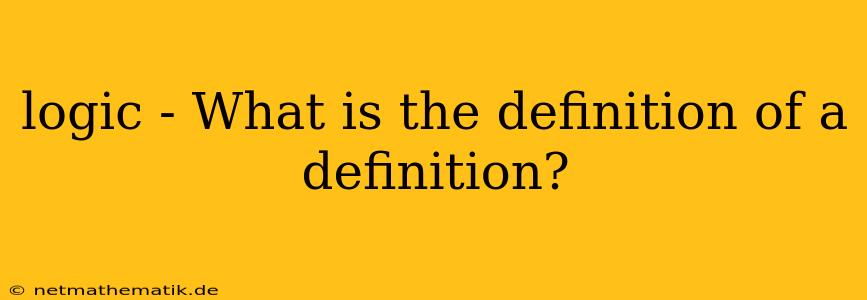The concept of "definition" is a fundamental pillar of understanding and communication, yet it's a concept that can easily lead to circularity and philosophical debate. What is a definition, truly? In essence, it's an attempt to convey the meaning of a term or concept in a clear and concise manner. But how do we define "definition" itself? This seemingly simple question opens a complex door into the very nature of language, knowledge, and the human mind. This article will explore the various aspects of definition, from its core function in communication to the challenges and intricacies it presents.
What is the Definition of a Definition?
A definition can be understood as a statement that explains the meaning of a word, term, or concept. It aims to provide a clear and concise explanation, often by specifying the essential characteristics or properties of the defined entity. This process of defining is crucial for our ability to communicate effectively and to share knowledge. Without definitions, our understanding of the world would be incredibly fragmented and subjective.
Types of Definitions:
There are several types of definitions, each with its own specific purpose and approach:
- Lexical definitions: These are concerned with the meaning of a word as it is used in a language. Dictionaries are excellent sources of lexical definitions. For example, the definition of "dog" in a dictionary might be "a domesticated canine animal."
- Real definitions: These focus on the essential nature or properties of the object or concept being defined. They attempt to capture the true essence of the thing. For instance, a real definition of "human" might be "a rational being with the capacity for moral action."
- Operational definitions: These define a concept by specifying the operations or procedures used to measure or identify it. For example, an operational definition of "intelligence" might be "the score on a standardized IQ test."
- Stipulative definitions: These are definitions that introduce a new term or assign a specific meaning to an existing term for the purposes of a particular discussion or context. For example, in a scientific paper, a researcher might stipulate a specific definition for "stress" based on their study's framework.
The Importance of Definitions:
Definitions play a vital role in our lives and society, acting as the foundation for communication, understanding, and knowledge acquisition. Some key aspects of their importance include:
- Clarity and Precision: Definitions enable us to express our ideas and thoughts with clarity and precision. By understanding the meaning of words, we can avoid ambiguity and misunderstandings.
- Shared Understanding: Definitions contribute to a shared understanding among individuals. They allow us to communicate effectively by aligning our interpretations of terms and concepts.
- Building Knowledge: Definitions are essential for expanding our knowledge base. By defining new terms and concepts, we create a framework for understanding and exploring complex ideas.
Challenges in Defining:
Despite their importance, definitions are not without their challenges. Some inherent difficulties include:
- Circular Definitions: A definition that uses the word or concept being defined within its own definition is considered circular. For example, defining "chair" as "an object designed for sitting" is circular because it relies on the concept of "sitting" which is inherently related to a chair.
- Ambiguity and Vagueness: Definitions can be ambiguous or vague, leading to different interpretations. For example, the definition of "justice" can vary greatly depending on the context and perspective.
- Evolution of Meaning: The meaning of words can change over time, requiring updates and revisions to definitions. For instance, the term "computer" has undergone a significant evolution in meaning since its initial definition.
- Defining Abstract Concepts: Defining abstract concepts, like "love" or "freedom," can be particularly challenging due to their subjective nature and the lack of clear boundaries.
The Role of Logic in Definitions:
Logic plays a crucial role in constructing and evaluating definitions. It helps us to identify potential fallacies and ensure that definitions are consistent and coherent. Here's how logic contributes to our understanding of definitions:
- Consistency: Logical principles ensure that definitions are consistent with other established knowledge and definitions within a given system. This helps avoid contradictions and inconsistencies.
- Clarity: Logical reasoning aids in formulating clear and unambiguous definitions, minimizing the potential for misinterpretations.
- Validity: Logic helps to assess the validity of definitions by examining the relationship between the definition and the concept it aims to define. For example, a definition of "bird" should encompass the essential characteristics that make it a bird, such as feathers, wings, and the ability to fly.
The Philosophical Dimension of Definition:
The concept of definition has deep philosophical implications. Philosophers have grappled with questions about the nature of language, meaning, and knowledge in relation to definitions. Here are some key philosophical considerations:
- Realism vs. Nominalism: Philosophers debate whether definitions capture a real, objective essence of things (realism) or simply reflect our subjective understanding of those things (nominalism).
- Essentialism vs. Anti-Essentialism: Some argue that definitions should be based on essential, unchanging properties of objects or concepts (essentialism). Others contend that definitions are fluid and subject to change based on our evolving understanding (anti-essentialism).
Conclusion:
Defining "definition" is a complex endeavor that touches upon fundamental aspects of language, knowledge, and our understanding of the world. While definitions are essential for effective communication and knowledge acquisition, they are not without their challenges and limitations. Recognizing these limitations and engaging with the philosophical underpinnings of definition can enhance our understanding of this fundamental concept and its role in our lives. Understanding the concept of definition itself is a crucial aspect of logic and critical thinking. As we continue to explore the nuances of language and meaning, our understanding of definition will continue to evolve and refine.
